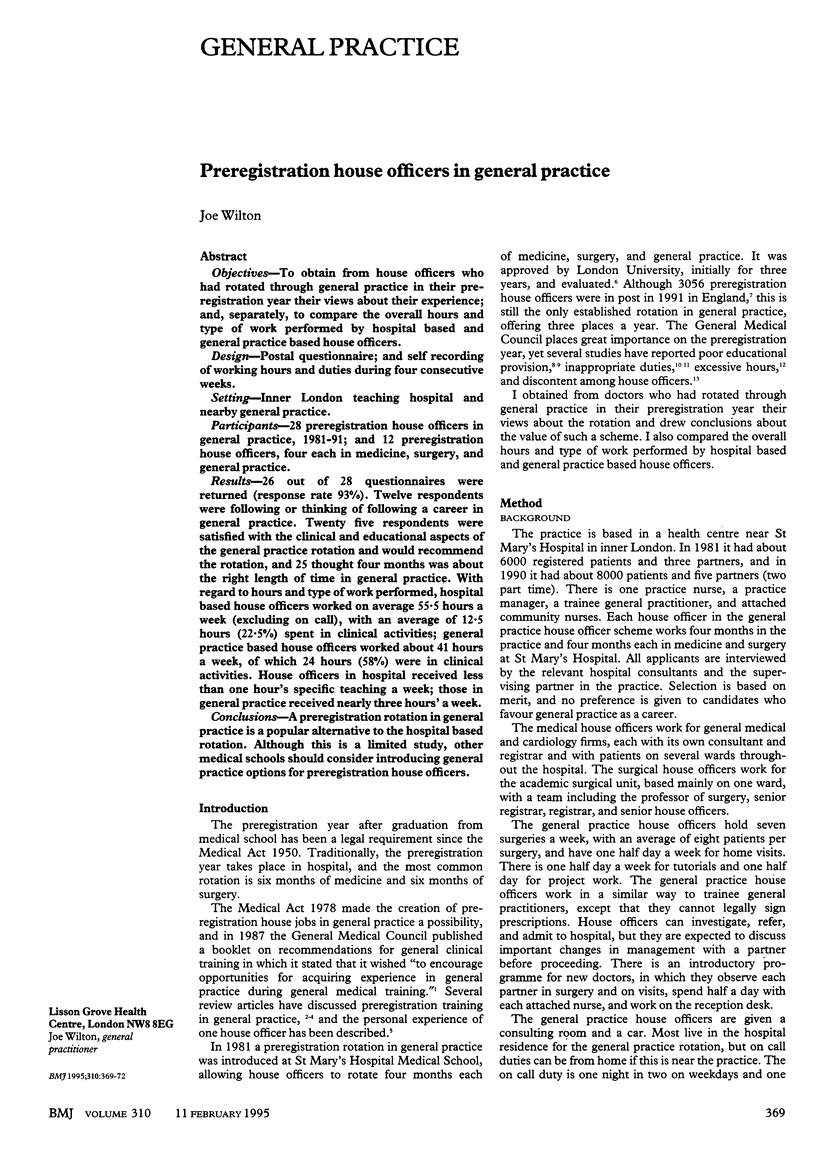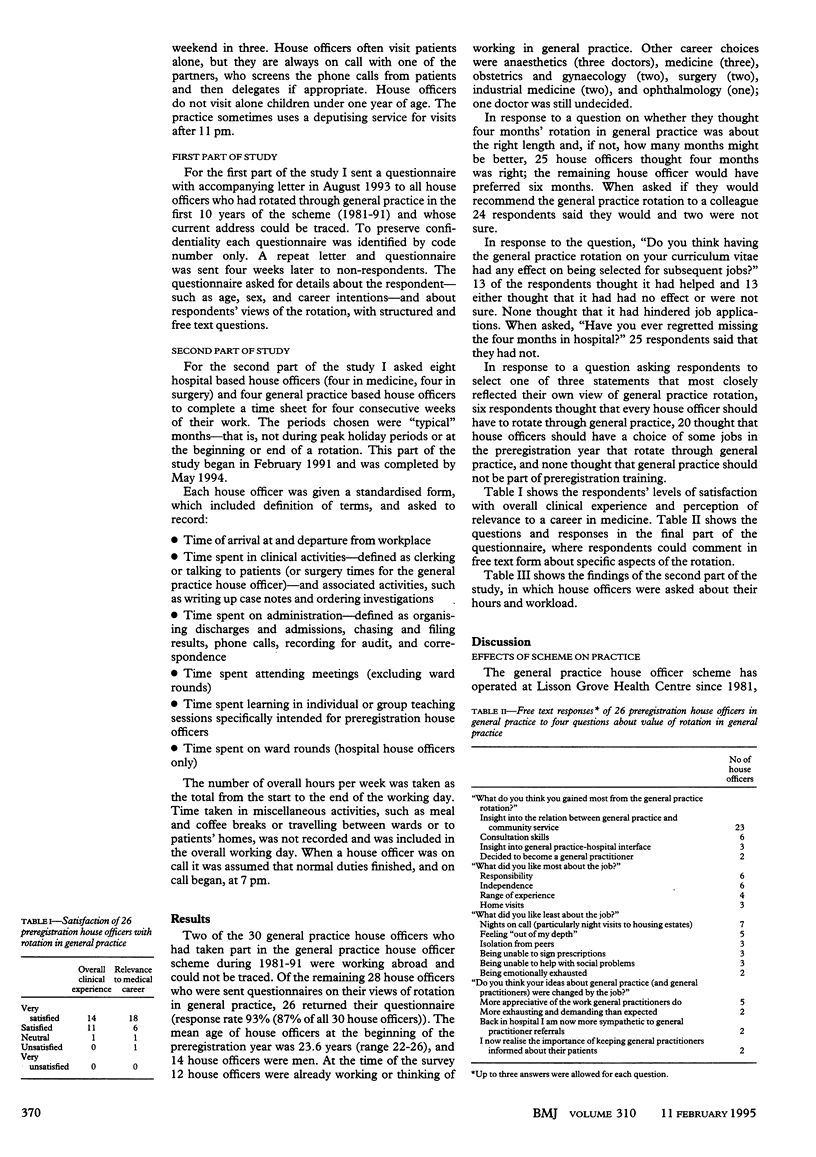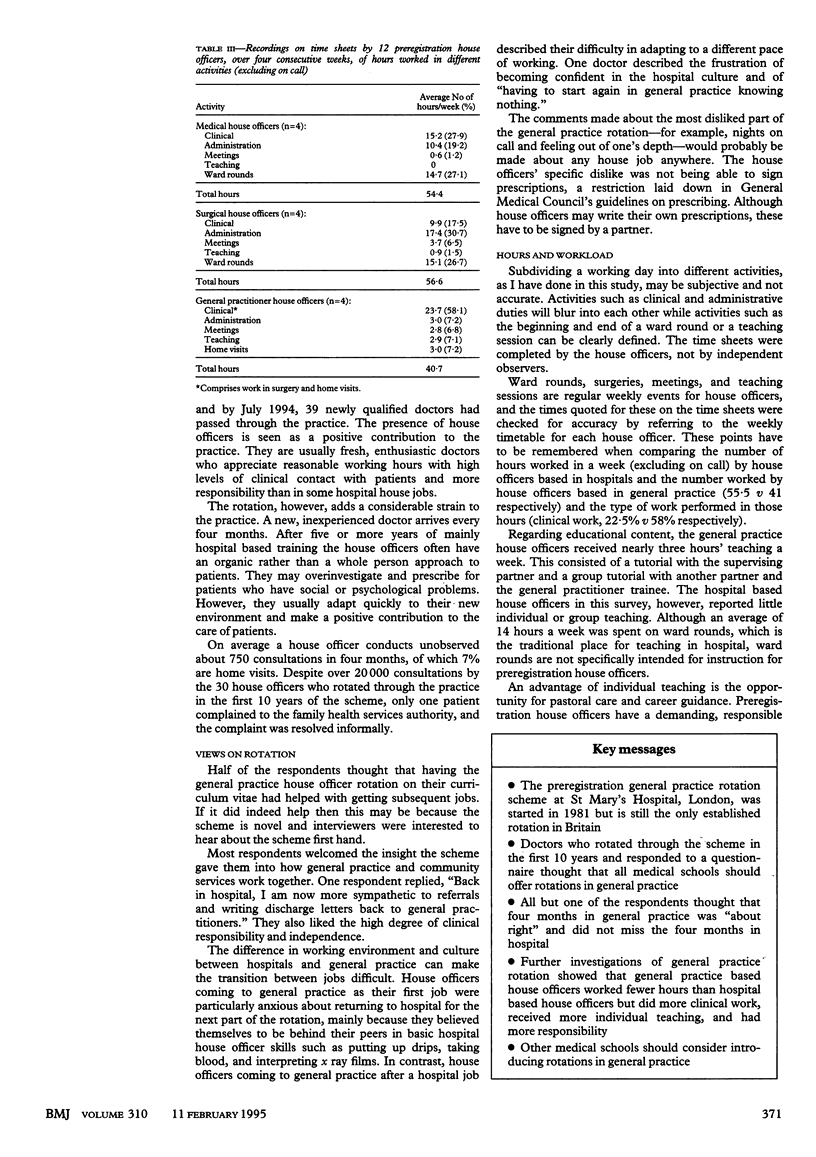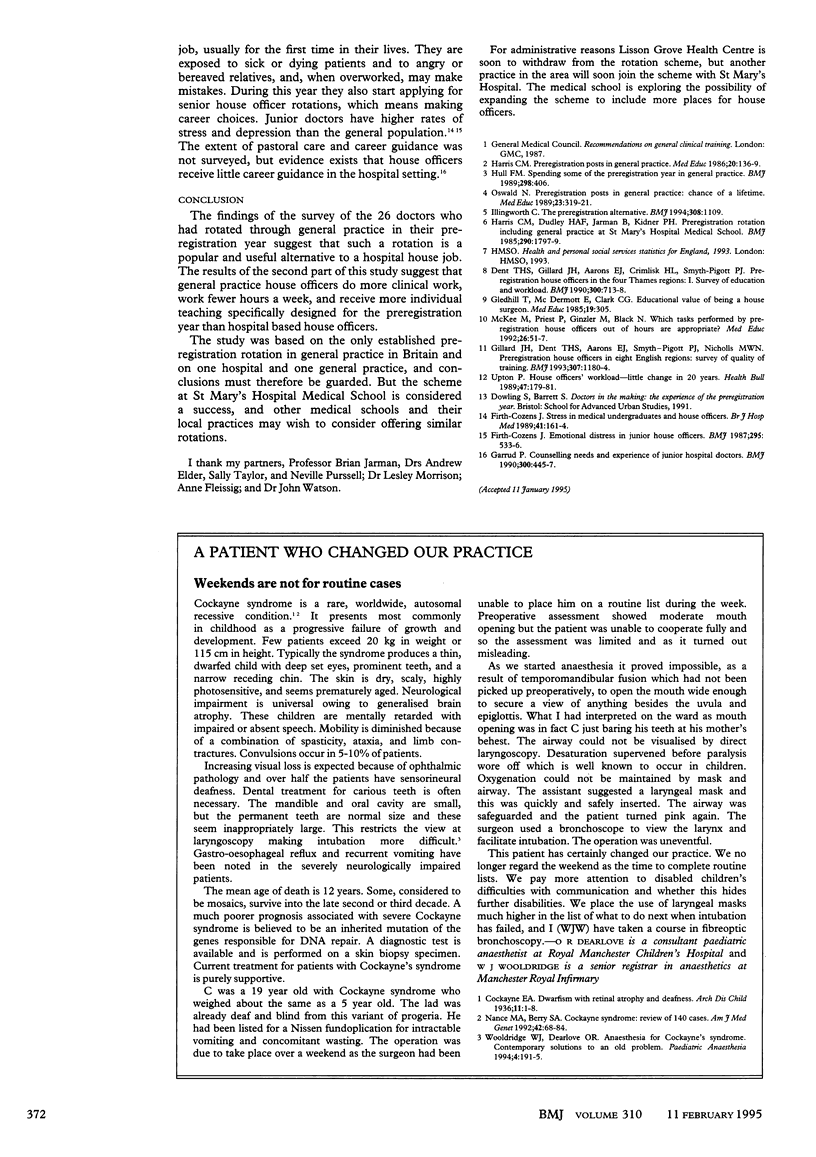Abstract
OBJECTIVES--To obtain from house officers who had rotated through general practice in their pre-registration year their views about their experience; and, separately, to compare the overall hours and type of work performed by hospital based and general practice based house officers. DESIGN--Postal questionnaire; and self recording of working hours and duties during four consecutive weeks. SETTING--Inner London teaching hospital and nearby general practice. PARTICIPANTS--28 preregistration house officers in general practice, 1981-91; and 12 preregistration house officers, four each in medicine, surgery, and general practice. RESULTS--26 out of 28 questionnaires were returned (response rate 93%). Twelve respondents were following or thinking of following a career in general practice. Twenty five respondents were satisfied with the clinical and educational aspects of the general practice rotation and would recommend the rotation, and 25 thought four months was about the right length of time in general practice. With regard to hours and type of work performed, hospital based house officers worked on average 55.5 hours a week (excluding on call), with an average of 12.5 hours (22.5%) spent in clinical activities; general practice based house officers worked about 41 hours a week, of which 24 hours (58%) were in clinical activities. House officers in hospital received less than one hour's specific teaching a week; those in general practice received nearly three hours' a week. CONCLUSIONS--A preregistration rotation in general practice is a popular alternative to the hospital based rotation. Although this is a limited study, other medical schools should consider introducing general practice options for preregistration house officers.
Full text
PDF



Selected References
These references are in PubMed. This may not be the complete list of references from this article.
- Cockayne E. A. Dwarfism with retinal atrophy and deafness. Arch Dis Child. 1936 Feb;11(61):1–8. doi: 10.1136/adc.11.61.1. [DOI] [PMC free article] [PubMed] [Google Scholar]
- Dent T. H., Gillard J. H., Aarons E. J., Crimlisk H. L., Smyth-Pigott P. J. Preregistration house officers in the four Thames regions: I. Survey of education and workload. BMJ. 1990 Mar 17;300(6726):713–716. doi: 10.1136/bmj.300.6726.713. [DOI] [PMC free article] [PubMed] [Google Scholar]
- Firth-Cozens J. Emotional distress in junior house officers. Br Med J (Clin Res Ed) 1987 Aug 29;295(6597):533–536. doi: 10.1136/bmj.295.6597.533. [DOI] [PMC free article] [PubMed] [Google Scholar]
- Firth-Cozens J. Stress in medical undergraduates and house officers. Br J Hosp Med. 1989 Feb;41(2):161–164. [PubMed] [Google Scholar]
- Garrud P. Counselling needs and experience of junior hospital doctors. BMJ. 1990 Feb 17;300(6722):445–447. doi: 10.1136/bmj.300.6722.445. [DOI] [PMC free article] [PubMed] [Google Scholar]
- Gillard J. H., Dent T. H., Aarons E. J., Smyth-Pigott P. J., Nicholls M. W. Preregistration house officers in eight English regions: survey of quality of training. BMJ. 1993 Nov 6;307(6913):1180–1184. doi: 10.1136/bmj.307.6913.1180. [DOI] [PMC free article] [PubMed] [Google Scholar]
- Gledhill T., McDermott E., Clark C. G. The educational value of being a house surgeon. Med Educ. 1985 Jul;19(4):305–307. doi: 10.1111/j.1365-2923.1985.tb01326.x. [DOI] [PubMed] [Google Scholar]
- Gordon B. R., Stein E., Jones P., Illingworth D. R. Indications for low-density lipoprotein apheresis. Am J Cardiol. 1994 Dec 1;74(11):1109–1112. doi: 10.1016/0002-9149(94)90461-8. [DOI] [PubMed] [Google Scholar]
- Harris C. M. Pre-registration posts in general practice. Med Educ. 1986 Mar;20(2):136–139. doi: 10.1111/j.1365-2923.1986.tb01061.x. [DOI] [PubMed] [Google Scholar]
- Hull F. M. Spending some of the preregistration year in general practice [. BMJ. 1989 Feb 18;298(6671):406–406. doi: 10.1136/bmj.298.6671.406. [DOI] [PMC free article] [PubMed] [Google Scholar]
- McKee M., Priest P., Ginzler M., Black N. Which tasks performed by pre-registration house officers out of hours are appropriate? Med Educ. 1992 Jan;26(1):51–57. doi: 10.1111/j.1365-2923.1992.tb00123.x. [DOI] [PubMed] [Google Scholar]
- Mutru O., Laakso M., Isomäki H., Koota K. Ten year mortality and causes of death in patients with rheumatoid arthritis. Br Med J (Clin Res Ed) 1985 Jun 15;290(6484):1797–1799. doi: 10.1136/bmj.290.6484.1797. [DOI] [PMC free article] [PubMed] [Google Scholar]
- Nance M. A., Berry S. A. Cockayne syndrome: review of 140 cases. Am J Med Genet. 1992 Jan 1;42(1):68–84. doi: 10.1002/ajmg.1320420115. [DOI] [PubMed] [Google Scholar]
- Oswald N. Pre-registration posts in general practice: the chance of a lifetime? Med Educ. 1989 Jul;23(4):319–321. doi: 10.1111/j.1365-2923.1989.tb01555.x. [DOI] [PubMed] [Google Scholar]
- Upton P. House officers' workload--little changes in 20 years. Health Bull (Edinb) 1989 Jul;47(4):179–181. [PubMed] [Google Scholar]


